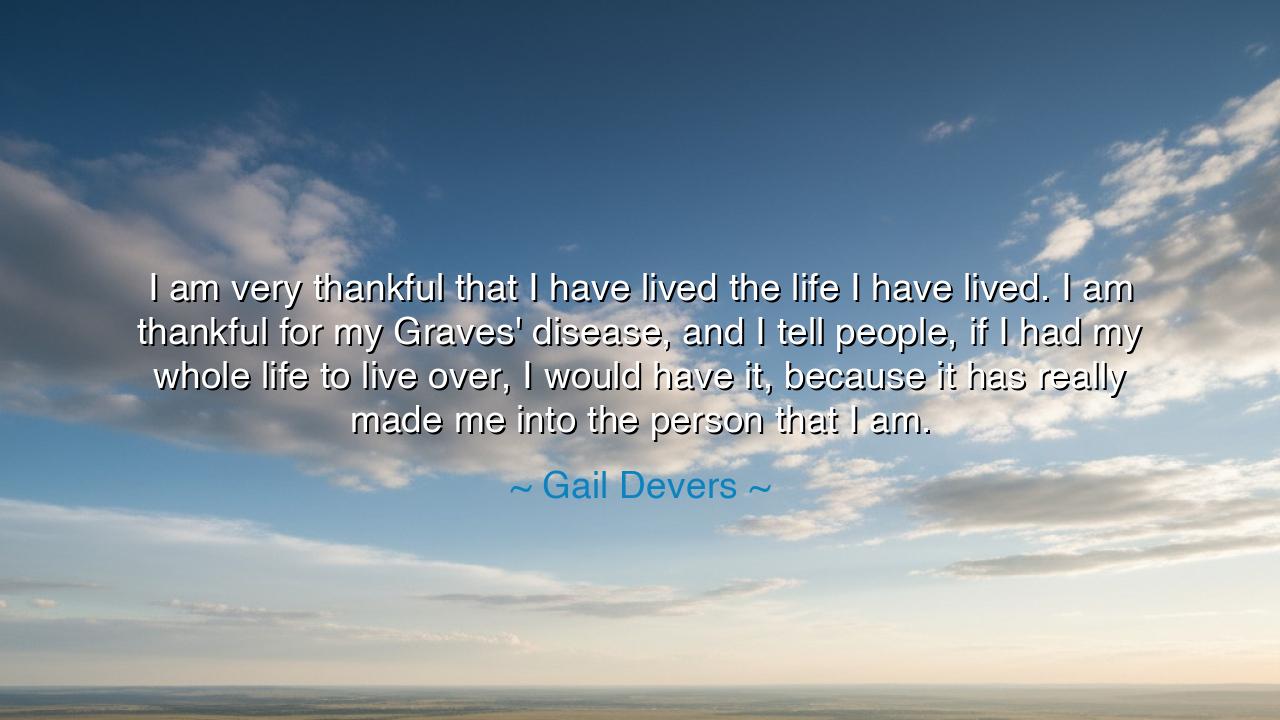
I am very thankful that I have lived the life I have lived. I am
I am very thankful that I have lived the life I have lived. I am thankful for my Graves' disease, and I tell people, if I had my whole life to live over, I would have it, because it has really made me into the person that I am.






When Gail Devers proclaims, “I am very thankful that I have lived the life I have lived. I am thankful for my Graves’ disease, and I tell people, if I had my whole life to live over, I would have it, because it has really made me into the person that I am,” her words strike with the power of paradox. She gives thanks not only for her triumphs, but for her suffering. She blesses not only her victories, but the very affliction that nearly destroyed her. This is not the shallow gratitude of one who rejoices in ease, but the hard-won wisdom of one who knows that even pain can be a teacher, even sickness can be a forge where character is refined.
The origin of her testimony lies in her own life as an Olympian, struck down in her prime by Graves’ disease, an autoimmune disorder that threatened not only her career but her life itself. Her body, which had carried her to glory on the track, was suddenly consumed by weakness and suffering. At one point, her illness was so severe that doctors considered amputating her feet. Yet Devers endured, recovered, and returned to the track, winning Olympic gold. Thus, when she says she is thankful for her disease, she speaks from the depth of one who has been tested by fire and emerged not only unbroken, but stronger.
This truth is echoed across the ages. Consider the story of Helen Keller, who lost both sight and hearing at a young age. What many saw as tragedy, she came to see as the shaping force of her life. Through her struggles, she discovered resilience, courage, and a vision of the human spirit that inspired millions. Like Devers, Keller might have lamented her condition, but instead, she embraced it as part of her identity, declaring that her challenges revealed the strength within her. Both women teach us that adversity, when embraced, becomes the soil where greatness grows.
There is profound humility in Devers’ words. She does not claim that she became who she is by talent alone, nor by ease, nor by the gifts of fortune. Instead, she acknowledges her suffering as the chisel that carved her character. This humility carries wisdom for all who struggle, reminding us that life is not defined by what happens to us, but by how we respond. Gratitude for suffering does not mean seeking pain, but recognizing that pain, once endured, can be transformed into wisdom, compassion, and strength.
Her testimony also teaches us about the redemptive power of acceptance. Many spend their lives resenting the hardships they face, cursing their misfortunes, wishing their lives had been easier. Yet Devers shows us a higher way: to accept our trials as part of the story that shapes us. She would not erase her disease, even if given the chance, because she understands that without it, she would not be the person she has become. To accept hardship in this way is to transform it into meaning, to turn the scars of life into emblems of strength.
The lesson for us is clear: do not despise the difficulties that life places before you. They may be the very trials that shape your destiny. When you encounter suffering, do not ask only, “Why me?” but also, “What can this make of me?” In your own struggles, remember Devers’ thankfulness, for it is not the absence of pain that makes a life great, but the courage to transform pain into purpose.
Practical wisdom follows. When hardship comes, endure with patience. Reflect upon your trials, asking how they have molded your heart, sharpened your mind, and deepened your soul. Speak gratitude not only for blessings that bring joy, but for challenges that bring growth. And when you share your story with others, do so with honesty, so that they too may see that their struggles are not meaningless, but fertile ground for strength.
Thus, in the words of Gail Devers, we hear the heroic echo of ancient truth: that the fire of suffering is also the fire of transformation. To be thankful even for affliction is the highest form of gratitude, for it acknowledges that all of life—its triumphs and its trials—works together to shape us into who we are meant to be. Let us then walk forward, not cursing our burdens, but carrying them with courage, until they too become blessings.






AAdministratorAdministrator
Welcome, honored guests. Please leave a comment, we will respond soon